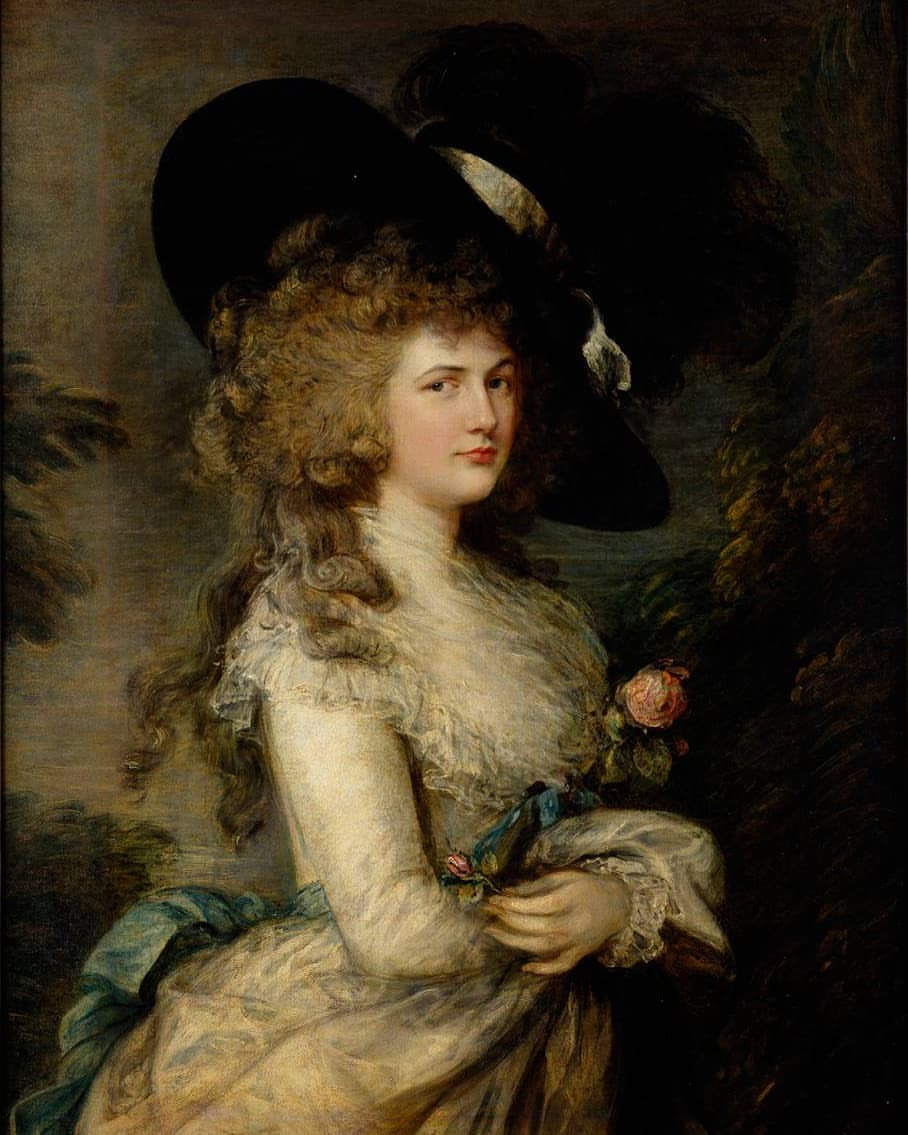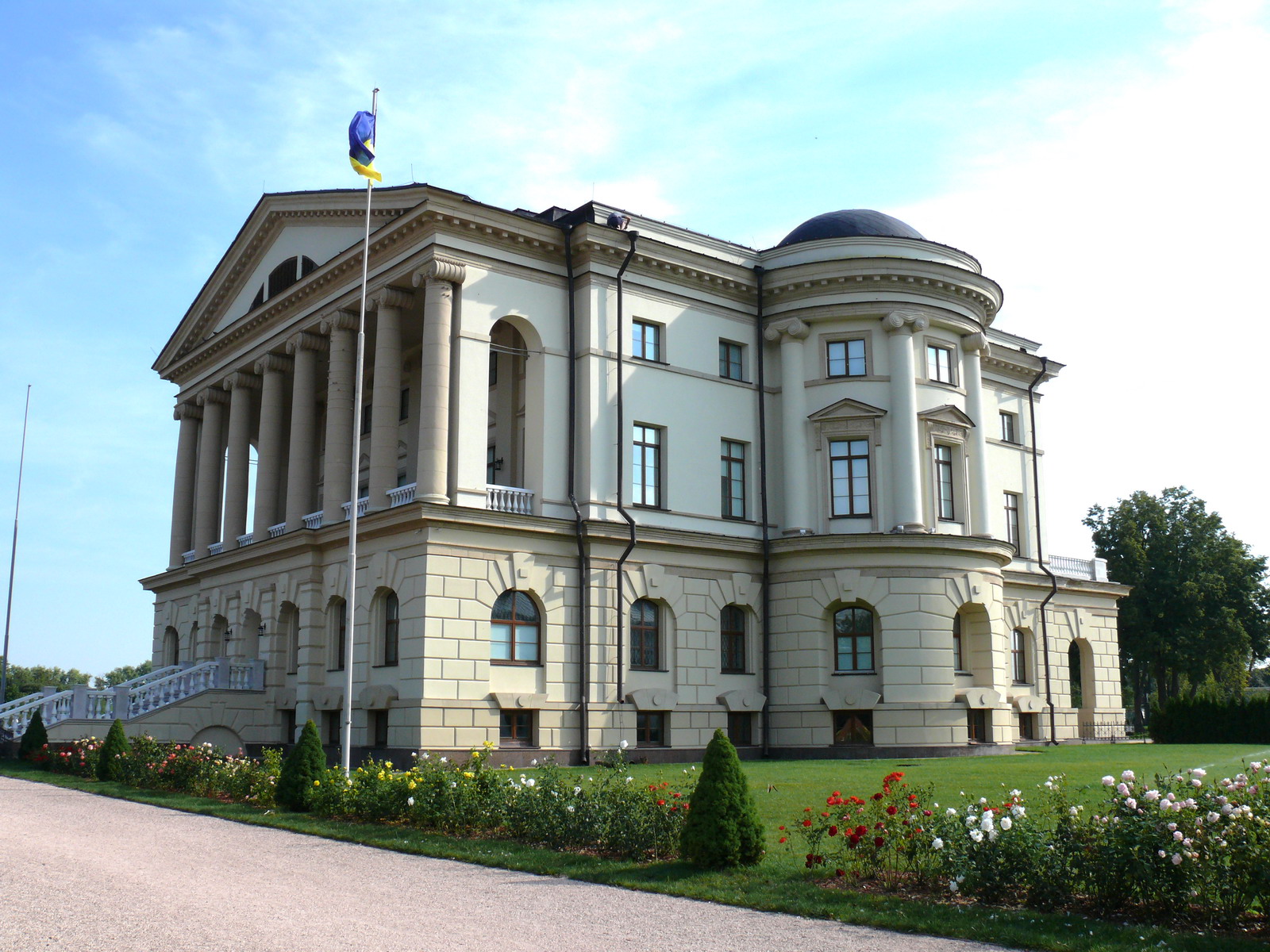|
Mavra Shuvalov
Mavra Yegorovna Shuvalov, née Shepeleva, (April 23 (4 May) 1708 – 9 (20) June 1759), was a Russian lady-in-waiting, socialite and noble and a confidante of Empress Elizabeth of Russia. She was in 1742 married to Count Peter Ivanovich Shuvalov. She played an influential role in Russia during the reign of Elizabeth. Biography She was born in a noble boyar family and was in 1719 appointed maid of honor to Princess Anna Petrovna. With a cheerful disposition and boldness, she became a favorite at court and a friend of princess Elizabeth. She followed Anna to Holstein in 1727, but corresponded with Elizabeth. Upon the accession of Elizabeth (1741), she was arranged to marry Shuvalov (1742), which was a beneficial match and thought to have been arranged by her influence on Elizabeth. The marriage was not particularly happy: the reports of foreign diplomats from Russia reported stories about the countless' betrayals of Shuvalov. However, with regard to obtaining and preserving powe ... [...More Info...] [...Related Items...] OR: [Wikipedia] [Google] [Baidu] |
Née
A birth name is the name of a person given upon birth. The term may be applied to the surname, the given name, or the entire name. Where births are required to be officially registered, the entire name entered onto a birth certificate or birth register may by that fact alone become the person's legal name. The assumption in the Western world is often that the name from birth (or perhaps from baptism or ''brit milah'') will persist to adulthood in the normal course of affairs—either throughout life or until marriage. Some possible changes concern middle names, diminutive forms, changes relating to parental status (due to one's parents' divorce or adoption by different parents). Matters are very different in some cultures in which a birth name is for childhood only, rather than for life. Maiden and married names The French and English-adopted terms née and né (; , ) denote an original surname at birth. The term ''née'', having feminine grammatical gender, can be u ... [...More Info...] [...Related Items...] OR: [Wikipedia] [Google] [Baidu] |
Lady-in-waiting
A lady-in-waiting or court lady is a female personal assistant at a court, attending on a royal woman or a high-ranking noblewoman. Historically, in Europe, a lady-in-waiting was often a noblewoman but of lower rank than the woman to whom she attended. Although she may either have received a retainer or may not have received compensation for the service she rendered, a lady-in-waiting was considered more of a secretary, courtier, or companion to her mistress than a servant. In other parts of the world, the lady-in-waiting, often referred to as ''palace woman'', was in practice a servant or a slave rather than a high-ranking woman, but still had about the same tasks, functioning as companion and secretary to her mistress. In courts where polygamy was practised, a court lady was formally available to the monarch for sexual services, and she could become his wife, consort, courtesan, or concubine. ''Lady-in-waiting'' or ''court lady'' is often a generic term for women ... [...More Info...] [...Related Items...] OR: [Wikipedia] [Google] [Baidu] |
Socialite
A socialite is a person from a wealthy and (possibly) aristocratic background, who is prominent in high society. A socialite generally spends a significant amount of time attending various fashionable social gatherings, instead of having traditional employment. Word history The word ''socialite'' is first attested in 1909 in a California newspaper. It was popularized by ''Time'' magazine in the 1920s.David E. Sumner, ''The Magazine Century: American Magazines Since 1900'', 2010, , p. 62 United Kingdom Historically, socialites in the United Kingdom were almost exclusively from the families of the aristocracy and landed gentry. Many socialites also had strong familial or personal relationships to the British royal family. Between the 17th and early 19th centuries, society events in London and at country houses were the focus of socialite activity. Notable examples of British socialites include Beau Brummell, Lord Alvanley, the Marchioness of Londonderry, Daisy, Princess o ... [...More Info...] [...Related Items...] OR: [Wikipedia] [Google] [Baidu] |
Nobility
Nobility is a social class found in many societies that have an aristocracy (class), aristocracy. It is normally ranked immediately below Royal family, royalty. Nobility has often been an Estates of the realm, estate of the realm with many exclusive functions and characteristics. The characteristics associated with nobility may constitute substantial advantages over or relative to non-nobles or simply formal functions (e.g., Order of precedence, precedence), and vary by country and by era. Membership in the nobility, including rights and responsibilities, is typically Hereditary title, hereditary and Patrilinearity, patrilineal. Membership in the nobility has historically been granted by a monarch or government, and acquisition of sufficient power, wealth, ownerships, or royal favour has occasionally enabled commoners to ascend into the nobility. There are often a variety of ranks within the noble class. Legal recognition of nobility has been much more common in monarchies, ... [...More Info...] [...Related Items...] OR: [Wikipedia] [Google] [Baidu] |
Elizabeth Of Russia
Elizabeth Petrovna (russian: Елизаве́та (Елисаве́та) Петро́вна) (), also known as Yelisaveta or Elizaveta, reigned as Empress of Russia from 1741 until her death in 1762. She remains one of the most popular Russian monarchs because of her decision not to execute a single person during her reign, her numerous construction projects, and her strong opposition to Prussian policies. The second-eldest daughter of Tsar Peter the Great (), Elizabeth lived through the confused successions of her father's descendants following her half-brother Alexei Petrovich, Tsarevich of Russia, Alexei's death in 1718. The throne first passed to her mother Catherine I of Russia (), then to her nephew Peter II of Russia, Peter II, who died in 1730 and was succeeded by Elizabeth's first cousin Anna of Russia, Anna. After the brief rule of Anna's infant great-nephew, Ivan VI of Russia, Ivan VI, Elizabeth seized the throne with the military's support and declared her own neph ... [...More Info...] [...Related Items...] OR: [Wikipedia] [Google] [Baidu] |
Peter Ivanovich Shuvalov
Count Pyotr Ivanovich Shuvalov (russian: Петр Иванович Шувалов; 1711 – ) was a Russian statesman and Field Marshal who, together with his brother Aleksandr Shuvalov, paved the way for the elevation of the Shuvalov family to the highest offices of the Russian Empire. He is also remembered as the founder of Izhevsk, the capital of Udmurtia. Pyotr Shuvalov began his career as a page at the court of tsesarevna Elizabeth. He was brought to tsesarevna's attention when he married her close friend and in-law, Mavra Shepeleva. For his assistance in the enthronement of Elizabeth, he was promoted to the rank of Chamberlain, then appointed senator and became a count in 1746. Initially, he was in charge of an army division stationed near St.Petersburg and then the Observation Corps, formed by Shuvalov himself and designated to protect the rear of the regular army. He also held the post of a conference minister and managed the artillery and weapons chancelleries ... [...More Info...] [...Related Items...] OR: [Wikipedia] [Google] [Baidu] |
Boyar
A boyar or bolyar was a member of the highest rank of the feudal nobility in many Eastern European states, including Kievan Rus', Bulgaria, Russia, Wallachia and Moldavia, and later Romania, Lithuania and among Baltic Germans. Boyars were second only to the ruling princes (in Bulgaria, tsars) from the 10th century to the 17th century. The rank has lived on as a surname in Russia, Finland, Lithuania and Latvia where it is spelled ''Pajari'' or ''Bajārs/-e''. Etymology Also known as bolyar; variants in other languages include bg, боляр or ; rus, боя́рин, r=boyarin, p=bɐˈjærʲɪn; ; ro, boier, ; and el, βογιάρος. The title Boila is predecessor or old form of the title Bolyar (the Bulgarian word for Boyar). Boila was a title worn by some of the Bulgar aristocrats (mostly of regional governors and noble warriors) in the First Bulgarian Empire (681–1018). The plural form of boila ("noble"), ''bolyare'' is attested in Bulgar inscriptions [...More Info...] [...Related Items...] OR: [Wikipedia] [Google] [Baidu] |
Anna Petrovna
Grand Duchess Anna Petrovna of Russia (russian: А́нна Петро́вна; 27 January 1708 – 4 March 1728) was the eldest daughter of Emperor Peter I of Russia and his wife Empress Catherine I. Her younger sister, Empress Elizabeth, ruled between 1741 and 1762. While a potential heir in the reign of her nephew Peter II, she never acceded to the throne due to political reasons. However, her son Peter III became Emperor in 1762, succeeding Elizabeth. She was the Duchess Consort of Holstein-Gottorp by marriage. She was born in Moscow and died in Kiel in her youth, at the age of 20. Early life Anna and Elizabeth were born out of wedlock, although their parents were married in 1712 and they were later legitimized. Their earlier illegitimacy would pose great challenges for their marriages. Anna grew up in the houses of Peter's younger sister Natalia and Prince Alexander Menshikov. Although born illegitimate, she and her younger sister Elizabeth were awarded the titles ... [...More Info...] [...Related Items...] OR: [Wikipedia] [Google] [Baidu] |
Holstein
Holstein (; nds, label= Northern Low Saxon, Holsteen; da, Holsten; Latin and historical en, Holsatia, italic=yes) is the region between the rivers Elbe and Eider. It is the southern half of Schleswig-Holstein, the northernmost state of Germany. Holstein once existed as the German County of Holstein (german: Grafschaft Holstein, links=no; 811–1474), the later Duchy of Holstein (german: Herzogtum Holstein, links=no; 1474–1866), and was the northernmost territory of the Holy Roman Empire. The history of Holstein is closely intertwined with the history of the Danish Duchy of Schleswig ( da, Slesvig, links=no). The capital of Holstein is Kiel. Holstein's name comes from the Holcetae, a Saxon tribe mentioned by Adam of Bremen as living on the north bank of the Elbe, to the west of Hamburg. The name means "dwellers in the wood" (Northern Low Saxon: ; german: Holzsassen, links=no). History Origins After the Migration Period of the Early Middle Ages, Holstein was adjacen ... [...More Info...] [...Related Items...] OR: [Wikipedia] [Google] [Baidu] |
Kirill Razumovsky
Count Kirill Grigoryevich Razumovski, anglicized as Cyril Grigoryevich Razumovski (russian: Кирилл Григорьевич Разумовский, uk, Кирило Григорович Розумовський ''Kyrylo Hryhorovych Rozumovsky''; 18 March 1728 – 1 January 1803) was a Russian Imperial statesman of Ukrainian Cossack descent, who served as the last Hetman of Zaporozhian Host on both sides of the Dnieper (from 1750 until 1764) and then as a Field marshal in the Russian Imperial Army. Razumovsky was the President of the St. Petersburg Imperial Academy of Sciences from 1746 until 1798. Biography Razumovsky was born to a family of low rank Cossack Hryhoriy Rozum in Lemeshi Russian Empire, Kiev Regiment on 18 March 1728.Putro, O. Kyrylo Rozumovsky (РОЗУМОВСЬКИЙ КИРИЛО ГРИГОРОВИЧ)'. Encyclopedia of History of Ukraine. The village Lemeshi where Razumovsky was born to this day stands in Chernihiv Raion, Chernihiv Oblast, Ukraine. F ... [...More Info...] [...Related Items...] OR: [Wikipedia] [Google] [Baidu] |
1708 Births
Seventeen or 17 may refer to: * 17 (number), the natural number following 16 and preceding 18 * one of the years 17 BC, AD 17, 1917, 2017 Literature Magazines * ''Seventeen'' (American magazine), an American magazine * ''Seventeen'' (Japanese magazine), a Japanese magazine Novels * ''Seventeen'' (Tarkington novel), a 1916 novel by Booth Tarkington *''Seventeen'' (''Sebuntiin''), a 1961 novel by Kenzaburō Ōe * ''Seventeen'' (Serafin novel), a 2004 novel by Shan Serafin Stage and screen Film * ''Seventeen'' (1916 film), an American silent comedy film *''Number Seventeen'', a 1932 film directed by Alfred Hitchcock * ''Seventeen'' (1940 film), an American comedy film *'' Eric Soya's '17''' (Danish: ''Sytten''), a 1965 Danish comedy film * ''Seventeen'' (1985 film), a documentary film * ''17 Again'' (film), a 2009 film whose working title was ''17'' * ''Seventeen'' (2019 film), a Spanish drama film Television * ''Seventeen'' (TV drama), a 1994 UK dramatic short starring Chr ... [...More Info...] [...Related Items...] OR: [Wikipedia] [Google] [Baidu] |



.jpg)
_-_contrast.jpg)
